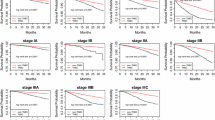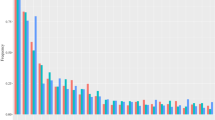Abstract
Purpose
Macrophages are a major cell type that can infiltrate solid tumors and exhibit distinct phenotypes in different tumor microenvironments. This study investigates the prognostic value of tumor-infiltrated CD163+ macrophages in patients with T1 high-grade (T1HG) bladder cancer.
Methods
CD163+ macrophages were assessed by immunohistochemistry in 94 T1HG bladder cancer samples. Kaplan–Meier analyses and Cox proportional hazards’ regression models were applied to evaluate recurrence-free survival, progression-free survival and disease-specific survival.
Results
With a median follow-up of 60 months, 37 (39.4%) patients experienced disease recurrence, 14 (14.9%) progression, 11 (11.7%) disease-specific mortality. High CD163+ macrophages were associated with higher risk of disease recurrence and progression (P < 0.05, for both). In multivariate Cox proportional hazards regression analysis, high CD163+ macrophages were a significant negative predictor of recurrence-free survival, progression-free survival and disease-specific survival (P < 0.05 for all).
Conclusion
CD163+ macrophages are a poor prognostic factor in T1HG bladder cancer. This finding provide the ground for further testing it in predicting the outcome of this challenging disease.


Similar content being viewed by others
References
Siegel RL, Miller KD, Jemal A (2018) Cancer statistics, 2018. CA Cancer J Clin 68:7–30
Svatek RS, Hollenbeck BK, Holmang S, Lee R, Kim SP, Stenzl A et al (2014) The economics of bladder cancer: costs and considerations of caring for this disease. Eur Urol 66:253–262
Kulkarni GS, Hakenberg OW, Gschwend JE, Thalmann G, Kassouf W, Kamat A et al (2010) An updated critical analysis of the treatment strategy for newly diagnosed high-grade T1 (previously T1G3) bladder cancer. Eur Urol 57:60–70
Denzinger S, Fritsche HM, Otto W, Blana A, Wieland WF, Burger M (2008) Early versus deferred cystectomy for initial high-risk pT1G3 urothelial carcinoma of the bladder: do risk factors define feasibility of bladder-sparing approach? Eur Urol 53:146–152
Canter D, Egleston B, Wong YN, Smaldone MC, Simhan J, Greenberg RE et al (2013) Use of radical cystectomy as initial therapy for the treatment of high-grade T1 urothelial carcinoma of the bladder: a SEER database analysis. Urol Oncol 31:866–870
Bhardwaj N (2007) Harnessing the immune system to treat cancer. J Clin Investig 117:1130–1136
De Palma M, Lewis CE (2013) Macrophage regulation of tumor responses to anticancer therapies. Cancer Cell 23:277–286
Qian BZ, Pollard JW (2010) Macrophage diversity enhances tumor progression and metastasis. Cell 141:39–51
Shabo I, Olsson H, Sun XF, Svanvik J (2009) Expression of the macrophage antigen CD163 in rectal cancer cells is associated with early local recurrence and reduced survival time. Int J Cancer 125:1826–1831
Comito G, Giannoni E, Segura CP, Barcellos-de-Souza P, Raspollini MR, Baroni G et al (2014) Cancer-associated fibroblasts and M2-polarized macrophages synergize during prostate carcinoma progression. Oncogene 33:2423–2431
Lau SK, Chu PG, Weiss LM (2004) CD163: a specific marker of macrophages in paraffin-embedded tissue samples. Am J Clin Pathol 122:794–801
Ambarus CA, Krausz S, van Eijk M, Hamann J, Radstake TR, Reedquist KA et al (2012) Systematic validation of specific phenotypic markers for in vitro polarized human macrophages. J Immunol Methods 375:196–206
Lan C, Huang X, Lin S, Huang H, Cai Q, Wan T et al (2013) Expression of M2-polarized macrophages is associated with poor prognosis for advanced epithelial ovarian cancer. Technol Cancer Res Treat 12:259–267
Sugimoto M, Mitsunaga S, Yoshikawa K, Kato Y, Gotohda N, Takahashi S et al (2014) Prognostic impact of M2 macrophages at neural invasion in patients with invasive ductal carcinoma of the pancreas. Eur J Cancer 50:1900–1908
Ding P, Wang W, Wang J, Yang Z, Xue L (2014) Expression of tumor-associated macrophage in progression of human glioma. Cell Biochem Biophys 70:1625–1631
Balermpas P, Rodel F, Liberz R, Oppermann J, Wagenblast J, Ghanaati S et al (2014) Head and neck cancer relapse after chemoradiotherapy correlates with CD163+ macrophages in primary tumour and CD11b+ myeloid cells in recurrences. Br J Cancer 111:1509–1518
Hu Y, He MY, Zhu LF, Yang CC, Zhou ML, Wang Q et al (2016) Tumor-associated macrophages correlate with the clinicopathological features and poor outcomes via inducing epithelial to mesenchymal transition in oral squamous cell carcinoma. J Exp Clin Cancer Res CR 35:12
Ma C, Komohara Y, Ohnishi K, Shimoji T, Kuwahara N, Sakumura Y et al (2016) Infiltration of tumor-associated macrophages is involved in CD44 expression in clear cell renal cell carcinoma. Cancer Sci 107:700–707
May M, Brookman-Amissah S, Roigas J, Hartmann A, Storkel S, Kristiansen G et al (2010) Prognostic accuracy of individual uropathologists in noninvasive urinary bladder carcinoma: a multicentre study comparing the 1973 and 2004 World Health Organisation classifications. Eur Urol 57:850–858
Chou R, Buckley D, Fu R, Gore JL, Gustafson K, Griffin J et al (2015) Emerging approaches to diagnosis and treatment of non-muscle-invasive bladder cancer. Agency for Healthcare Research and Quality, Rockville, MD
Zuiverloon TC, Nieuweboer AJ, Vekony H, Kirkels WJ, Bangma CH, Zwarthoff EC (2012) Markers predicting response to bacillus Calmette-Guerin immunotherapy in high-risk bladder cancer patients: a systematic review. Eur Urol 61:128–145
Fristrup N, Ulhoi BP, Birkenkamp-Demtroder K, Mansilla F, Sanchez-Carbayo M, Segersten U et al (2012) Cathepsin E, maspin, Plk1, and survivin are promising prognostic protein markers for progression in non-muscle invasive bladder cancer. Am J Pathol 180:1824–1834
van Rhijn BW, Liu L, Vis AN, Bostrom PJ, Zuiverloon TC, Fleshner NE et al (2012) Prognostic value of molecular markers, sub-stage and European Organisation for the Research and Treatment of Cancer risk scores in primary T1 bladder cancer. BJU Int 110:1169–1176
Oldenhuis CN, Oosting SF, Gietema JA, de Vries EG (2008) Prognostic versus predictive value of biomarkers in oncology. Eur J Cancer 44:946–953
Hewitt SM (2012) Tissue microarrays as a tool in the discovery and validation of predictive biomarkers. Methods Mol Biol 823:201–214
Funding
This work was supported by Shanghai Municipal Health Bureau (CN) (No. 20164Y0124), Incubating Program for clinical Research and Innovation of Ren Ji Hospital, School of Medicine, Shanghai Jiao Tong University (PYII-17-010).
Author information
Authors and Affiliations
Contributions
GY, JB: Protocol/project development. GY, LZ, ML: Data collection or management. QL, XD: Data analysis. GY, JB: Manuscript writing/editing.
Corresponding author
Ethics declarations
Conflict of interest
The authors declare that they have no conflict of interest.
Research ethics/informed consent
The study was performed according to the Helsinki Declaration and approved by the Ethics Committee of Renji hospital, school of medicine, Shanghai Jiaotong University, China; Number: 335/16). This was a retrospective study evaluating perioperative data. A signed informed consent was obtained from the patients.
Rights and permissions
About this article
Cite this article
Yang, G., Zhang, L., Liu, M. et al. CD163+ macrophages predict a poor prognosis in patients with primary T1 high-grade urothelial carcinoma of the bladder. World J Urol 37, 2721–2726 (2019). https://doi.org/10.1007/s00345-018-02618-1
Received:
Accepted:
Published:
Issue Date:
DOI: https://doi.org/10.1007/s00345-018-02618-1




